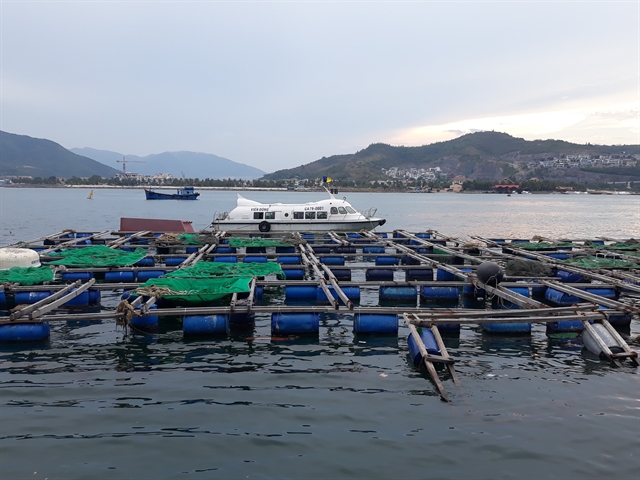 Society
Society

Nha Trang City has set aside a zone covering 70ha of surface water in Nha Trang Bay for cage aquaculture, according to the city’s People’s Committee.

|
| A floating raft with cages for breeding fish on Trí Nguyên Island in Nha Trang Bay in Khánh Hòa Province. – VNA/VNS Photo Phan Sáu |
KHÁNH HÒA – Nha Trang City has set aside a zone covering 70ha of surface water in Nha Trang Bay for cage aquaculture, according to the city’s People’s Committee.
Located in the south-central province of Khánh Hòa, the city will focus on cage farming on Trí Nguyên and Bích Đầm islands and a 50ha water surface area between Bích Đầm and Đầm Bấy islands in Nha Trang Bay.
Under an aquaculture plan to 2035 in the bay, approved by the city’s People’s Committee, there will be 100 floating rafts with 2,931 traditional cages in Trí Nguyên and 30 floating rafts with 1,125 traditional cages in Bích Đầm by 2025.
The traditional cages are 4 metres wide and 4 metres long, and will contain mostly lobsters and marine fish species.
Trí Nguyên now has 127 floating rafts with 3,366 traditional cages and Bích Đầm has 29 floating crafts with 710 traditional cages.
In the 50ha water surface area between Bích Đầm and Đầm Bấy, there will be 60 large cages using advanced farming techniques by 2025.
The large round cages have a diameter of 20 metres.
Advanced farming techniques include the use of high-density polyethylene (HDPE) floating cages and nets with anti-fouling coatings.
The durable HDPE floating cages can withstand winds and waves, are able to breed a large quantity of fish, and are convenient for checking fish and harvesting them.
In the 2026-35 period, the city plans to reduce the number of traditional cages in Trí Nguyên and Bích Đầm.
During the period, the city will develop four floating cages with advanced farming techniques in Trí Nguyên and three floating cages in Bích Đầm.
The city will maintain the 50ha water surface area between Bích Đầm and Đầm Bấy for cage aquaculture in the 2026-35 period.
Farmers will also receive support from the city to relocate their floating cages to zoned areas, according to the city’s People’s Committee.
The city will also encourage farmers to use floating cages with advanced farming techniques to reduce risks caused by natural disasters and disease, and to use industrial food to feed aquatic species to prevent pollution in the bay.
Đào Thanh Tùng, head of the Nha Trang City Economy Bureau, said the zoning of cage aquaculture would reduce the density of floating cages and prevent water pollution caused by overcrowding.
After implementing the zoning, farmers and local authorities will be able to easily control diseases and the seed quality of farmed aquatic species, he said.
In addition, the origin of farmed aquatic species can be traced, which makes it easier to export via official channels, he said.
Khánh Hòa is considered the capital of aquaculture in the country’s south-central region.
The province, which has many deep bays, has favourable conditions for aquaculture as it has long coast and clean sea water with suitable salinity level for marine aquaculture.
Its Nha Trang, Cam Ranh and Vân Phong bays have a total area of more than 100,000ha. The bays’ natural conditions and hydrology are suited for breeding marine aquatic species, especially lobsters and marine fish. — VNS




